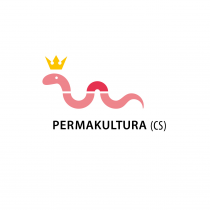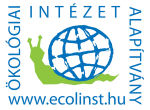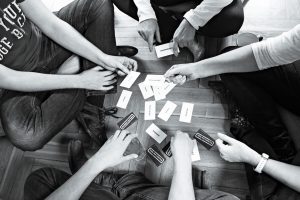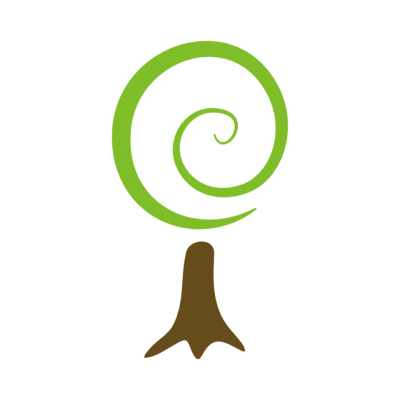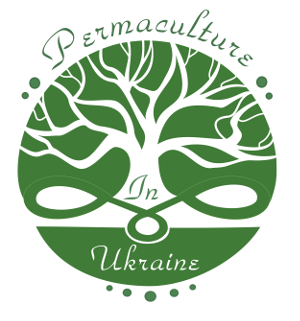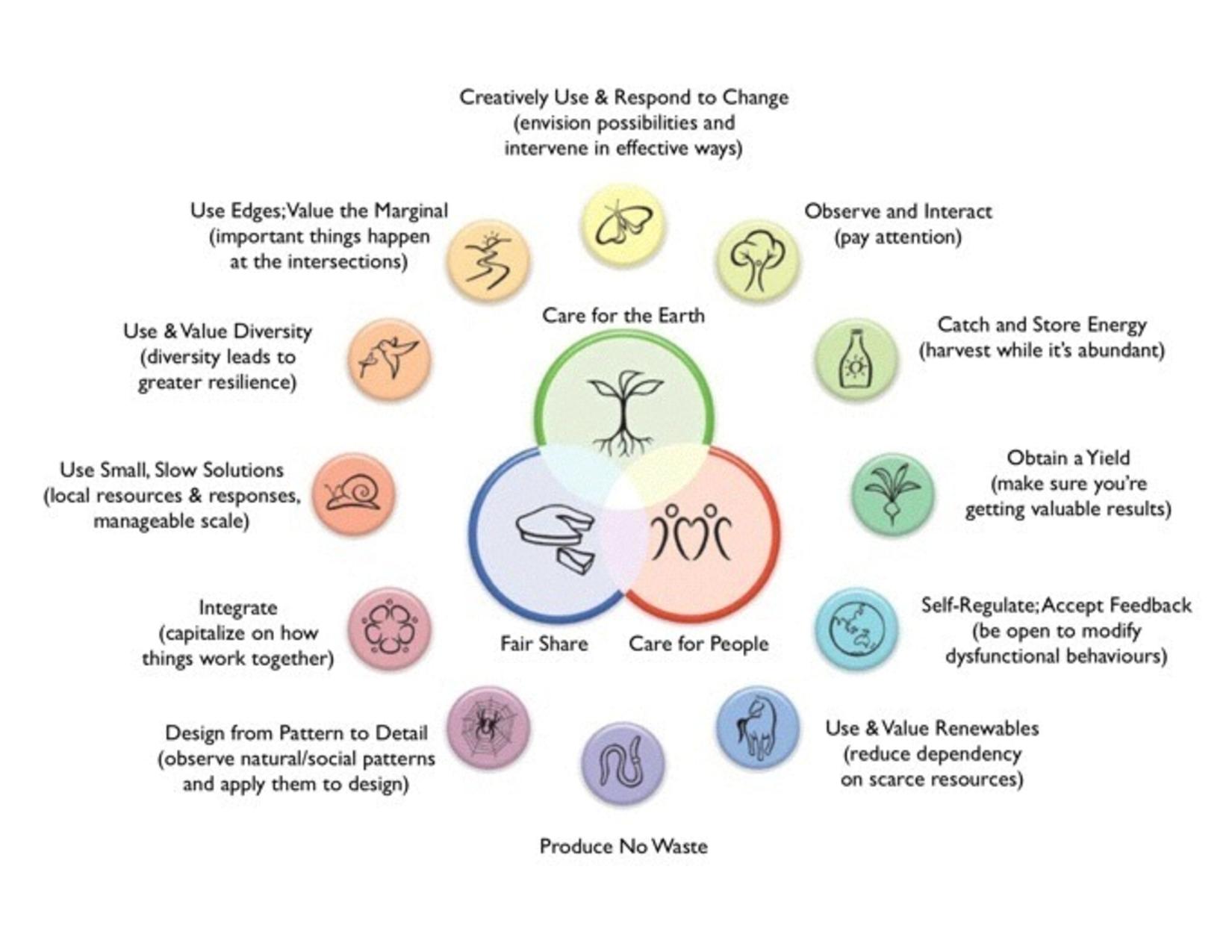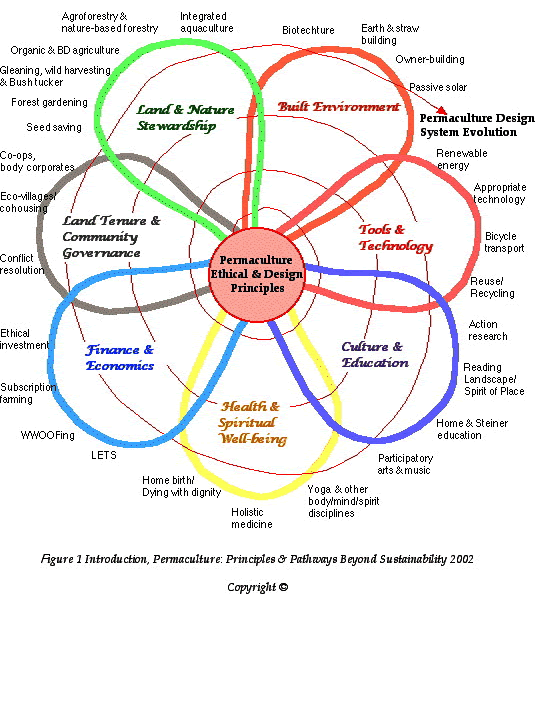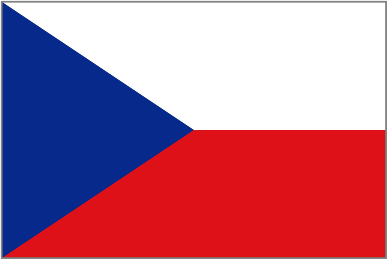 Česky Česky |
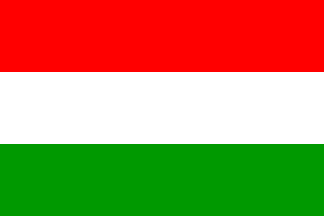 Magyar Magyar |
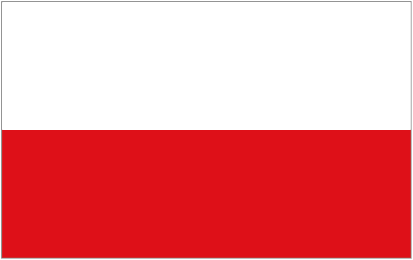 Polski Polski |
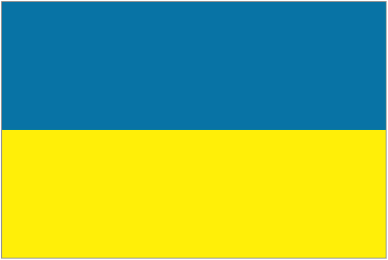 Українська Українська |
Info partners  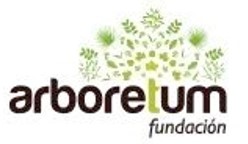 |
|||
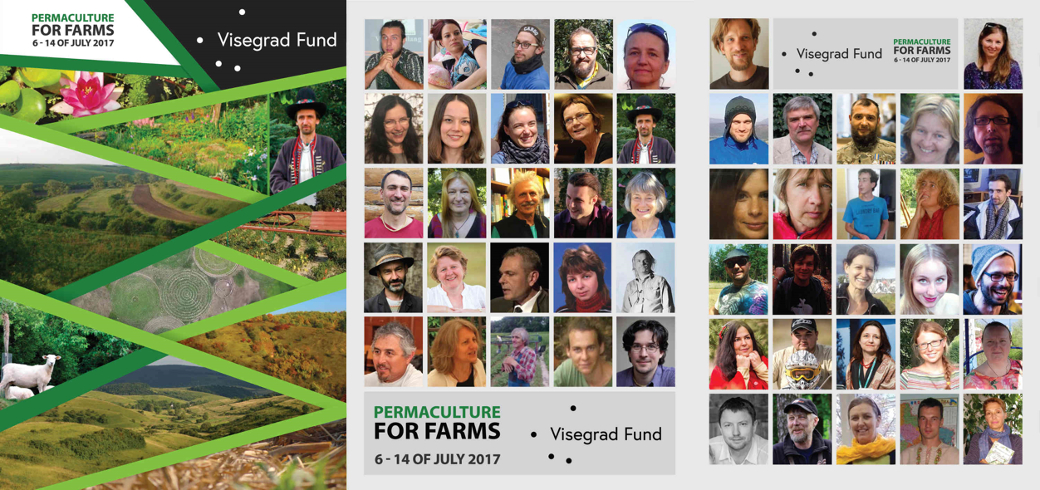
Farm tour
Watch all the films
- Estate on Vartovna
- Garden for the Future
- Revitalization projects
- Pangea, White-carpathian fruit treasure
- Ján Šlinský farm, Agrokruh
- Ecological Institute for Sustainable Development
Estate on Vartovna
Jasenná, Czech Republic
 |
 |
A family estate on Vizovice hill, 5 ha of land, orchards, forest, pastures, garden. A young family from big city of Brno lives in this place for 9 years.
Specialization
- Goat and sheep products
- Fruits (apples, plums) and fruit products
What will you see
- Keeping of goats and sheep and using their products for sale and barter
- Getting financial support from programmes of environmental education - cooperation with Brno environmental groups and schools
- Usage of a donkey for work and trips
- Ecotourism
Garden for the Future (watch the film)
Vizovice, Czech Republic

An example of a very diversified project of a permaculturist who supports himself by many ways.
Specialization
- Teaching and consultations - Eastern (Chinese) medicine, research of the Central European plants which can substitute the exotic ones, nutrition consultant
- Growing medicinal herbs (8 acres) including very exotic species, healing practice
What will you see
- Herbal garden (8 acres) with more than 100 species (focus on Chinese medicine)
- Forest garden (0,5 ha) with extensively grown vegetables and fruits (old traditional varieties), free-range chicken and ducks, various types of garden beds (elevated, submerged)
- an intensive plot (0,5 ha) of annual vegetables for food self-sufficiency
What will you learn
- Creating a cooling pit (air-condition for the field caravan).
- Construction work on a walipini - underground glasshouse
Revitalization projects, Šardice (watch the film)
Šardice, Czech Republic, the 7th of July 2017
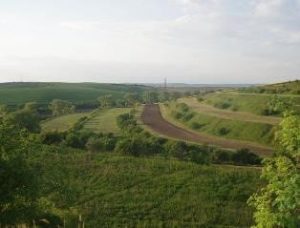 |
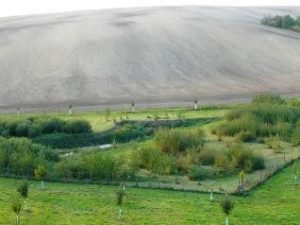 |
Petr Marada is Professor of the Mendel University in Brno, and Counsellor of the Czech Ministry of Agriculture. He implements many various projects of revitalization of the landscape, improving soil and water management and preserving wildlife, and use governmental grants also as a source of self-support.
Specialization
- The state supports the agriculturists who realize the „ecosystem services“ by grants, so it's possible to develop ecoagriculture enterprises which use the state financial support for revitalization of the landscape, and also provide a source of self-support for the entrepreneurs.
- In Šardice, we will see several examples of such measures, which are actually very close or even identical with the permaculture tools of agroforestry, keyline management or including the Zone 5 – wilderness – into the permaculture design.
What will you see
- „green spots“ like wetlands, ponds, biocorridors
- grassed terraces and swales
- Forest plantation on the soil which is difficult to use for farming
What will you learn
- Creating strategy how to motivate the conventional farmers to make the changes concerning the revitalization and adapting the landscape for the climate change?
Pangea, White-carpathian fruit treasure (watch the film)
Nová Bošáca, Slovakia
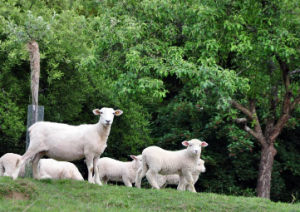 |
 |
Orchard with old apple species with the special grazing management by sheep and goats. It is also interesting place from point of ecological richness (orchids, butterflies). We will visit also new fruit tree nursery - the only one of its type in Slovakia.
The tour will be guided by Ľudo Vašš – a well-known fruit grower will specializing on untraditional species and varieties of fruit plants.
Specialization
- saving old varieties of fruit trees;
- juice production;
- sheep and goat breeding;
- water management.
What will you see
- biggest natural heritage recovery project in Slovakia
- enthusiastic presenter and lecturer
What will you learn
- how to capitalize old varieties of fruits
Ján Šlinský farm, Agrokruh (watch the film)
Senec, Slovakia
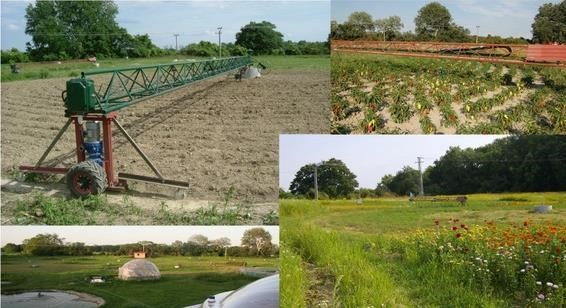 The system called “Agokruh” (“Agrocircle”) was designed by Jan Slinsky and is focused on mechanical cultivation of soil avoiding damage of soil microorganisms. This system is based on agricultural bridge technology used over the world mostly to carry irrigation. This system uses the technology to cultivate and aerate the soil without turning, plant the seedlings and carry the farmer for manual weeding or harvesting. The system works on electricity, so in future could be updated to work only on renewable resources.
The system called “Agokruh” (“Agrocircle”) was designed by Jan Slinsky and is focused on mechanical cultivation of soil avoiding damage of soil microorganisms. This system is based on agricultural bridge technology used over the world mostly to carry irrigation. This system uses the technology to cultivate and aerate the soil without turning, plant the seedlings and carry the farmer for manual weeding or harvesting. The system works on electricity, so in future could be updated to work only on renewable resources.
Specialization
- Vegetable growing
- Community supported agriculture
- Franchising the idea
What will you see
- Automated soil cultivation tool for market vegetable growing
- Geodome greenhouse
- Diversity and wildlife supporting islands between circular fields
- Natural building association and eco-centre nearby
What will you learn
- Ethical investment for farm starting
Ecological Institute for Sustainable Development (watch the film)
Gömörszőlős, Hungary
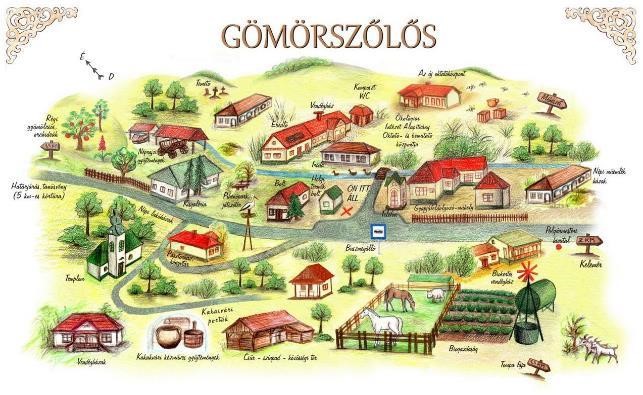
The Ecological Institute for Sustainable Development (EISD) is a foundation which aims to promote the idea of sustainable development by building understanding on the idea of sustainability and helping its practical implementation. EISD has an information center in Gömörszőlős, which is functioning as an advisory, demonstration and training center on alternative technologies and sustainable use of natural resources for the local communities and people.
Specialization
EISD has an innovation for small scale farming, called deep mulch technology to recreate the topsoil and soil biology, and to neglect ploughing, irrigation, weed control, fertilizers and chemicals. Deep mulch is a 50–60 cm thick cover made of organic litter ready for composting. Method has been applied for 14 years. See video “Smart and Eco-friendly gardening”.
What will you see
|
|
What will you learn
- How to prepare the deep mulch and how to use this for planting and cultivation;
- Zero plant protection;
- Efficient use of firewood.
Conference presentations
Watch all recorded conference presentations
| Presenters |
Topics
Basics, methods, and technologies
- How is sustainable permaculture in comparison to conventional and organic farms?
- Introduction to permaculture farming
- Diversification of organic food systems with minor cereals and landrace tomatoes
- Thirty years of experiences on a permaculture experimental site
- Organic cultivation of vegetables, fruits, berries, grapes, medicinal and ornamental plants in the system of permaculture design
- Czech farming projects Pozemská zahrada and KomPot
- Permaculture farms Veselá biofarma and Pozemská zahrada
- Garden of the Future – project of Petr Haba
- Permaculture farm of Ivana Květoňová
- Rozum beds: increasing soil fertility in a short time
- Rejuvenation technology of fruit trees with cultivar change
- Botanical pesticides and biomanagement of pests
Social issues and communities
- Implementation of the Programme of development of the countryside by means of eco-agro enterprising focused on ecosystem services in the Czech Republic
- Táncoskert - profitable permaculture through CSA
- Growing vegetables between idealism and technocracy
- Movement of Food Sovereignty
- Introduction of WWOOF and the possibilities of an organic network
- Cargonomia, sustainable transportation, healthy and local food and convivial space in Budapest
- Degrowth and permaculture
- Deep Democracy meets Permaculture: the cutting edge of diversity!
- New Ecology High Schools in XXI century
- Gaia theory and it’s practice in a local community - work in progress - pioneer stage ( Dancing Garden Workshops)
- Permaculture in the Gendered World
- One year on permaculture farm – Integrating with local community
- Permaculture for Farms: planning future collaboration
- Central European network of permaculture demonstration sites
Economy and legal issues
- How you can earn a livelihood through multiple income streams as a Permaculture farmer or gardener
- Wild plants for health and business
- Worm farming: from the single box to the whole farm
- Permaculture sanitation for farms and tourism
 Alfréd Szilágyi
Alfréd Szilágyi
Alfred is currently doing his masters studies at Szent Istvan University in Hungary studying organic agriculture. He holds a BSc diploma in agricultural engineering. He was already interested in permaculture during his BSc studies and wrote his thesis about permaculture design that he applied to the development plan of the open-air museum in Szenna, Hungary. He completed his internship at Keveral Farm, UK where he completed the PDC course too, his teachers were Klaudia Van Gool and Bryn Thomas. In the meantime he took part in establishing the Hungarian Permaculture Association (MAPER) and he is still a board member, mainly concentrating on the research side of permaculture. He initiated an informal platform to bring together academics and practitioners, he organised workshops and a symposium at his university. Currently he is working on a research project in collaboration with Fibl (Research Institute for Organic Agriculture) and CAWR (Center for Agroecology, Water and Resilience, Coventry University) to assess the sustainability performances of different farming systems. Besides he is active member of two other NGOs working on environmental education and local sustainability issues.
How is sustainable permaculture in comparison to conventional and organic farms?
There are more and more academic researches on permaculture and on other so-called social movements, alternative agricultural concepts but most of them concentrates on the social aspects and only a few of them look at the practices and the results of such systems. I wanted to see to which degree permaculture practitioners manage to reach sustainability goals in comparison to organic and conventional farmers.
During my presentation i will first introduce the SMART indicator system that has been developed by the swiss Fibl based on the SAFA guidelines published in 2013 by FAO about how to assess sustainability performance of a farm. I assessed and analised 30 farms in Hungary this year, conventionals, organics, and permaculture farms ten of each. At the end I will summarise the outcomes, and make further suggestions.
 Béla Baji
Béla Baji
Education: University of Horticulture, Budapest, 1978. Permaculture design course by Lea Harrison, 1991. Permaculture diploma by Peter Birkett in Bro,1999.
Subjects of involvement: Dendrology (botany, and gardening of exotic trees, and shrubs), organic gardening, permaculture field work, permaculture consultation and design.
Member of the Hungarian Permaculture Association.
Thirty years of experiences on a permaculture experimental site
The presentation is based on a slide show, to show the results of some projects and experiments inspired by the permaculture principles.
The following project will be shown:
- Tree planting methods on adverse conditions: Turning a cornfield into a mixed orchard-fodder tree forest.
- Turning an arable land into a natural grassland-fruitree system by scattering seeds of suitable species. Creating a diverse wildflower flora, by gathering, producing, and scattering the seeds of suitable species.
- Digging pits-building mounds on a plain area: Microclimate management, and increasing diversity by patterns of planting and by artificial landscape formation.
- Forest garden (after Robert Hart), or „edible forest” (after Geoff Lawton): In what extend do tolerate our vegetables the shadow of fruit trees?
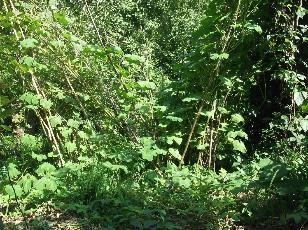 |
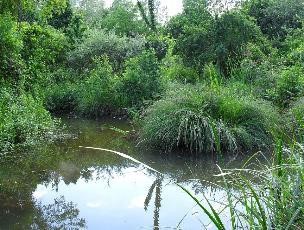 |
 Ben Lazar
Ben Lazar
Permaculture itinerant teacher who is the founder and editor of the educational portal PERMACULTURA .EDU .PL that coordinates the map of permaculture in Poland. Currently, Ben is running lectures on permaculture in large cities and permaculture workshops on farms in Poland. He is also involved in urban gardening and animating public gardens.
Ben is also animator of the Movement of Food Sovereignty "Nyeleni Polska"
Links:
Movement of Food Sovereignty and permaculture in Poland
I will talk about the current situation and state of permaculture in Poland, it's social dimension, urban actions and national strategies for food sovereignty (also in a global context). See Nyeleni Poland.
And I will talk about the workshops that I'm leading during the summer on different Polish farms. About the "permaculture tour" in Polish cities - this is what I am doing now.
 Bogdan Popov
Bogdan Popov
A blacksmith and an ecologist, director of ”Ecosolutions Forge Agency based in Transcarpathia (Ukraine). Focused on designing and building ecosaniation systems at the mountains. Student of B. Mollison, translator and editor of his permaculture books published in Russian.
Permaculture sanitation for farms and tourism
Sanitation can be a key element of permaculture design for farms and recreation facilities that closes the nutrient and water loops. The challenge is to create systems that fit in the local context meaning they are affordable, meet people’s expectations, not overcomplicated and require adequate energy and resource input while performing effectively.
Bogdan Popov, a permaculturist and a sanitation expert, will talkabout his practical experience with building these systems in Ukraine and will outline future ecosaniation trends useful for permaculture design.
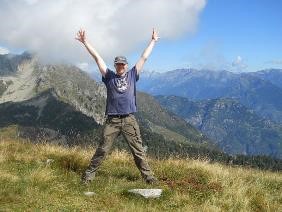 |
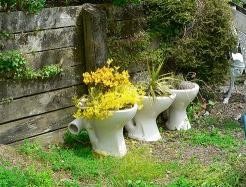 |
 Denisa Tomášková
Denisa Tomášková
Denisa Tomášková is a leading Czech permaculture teacher and a designer. Currently, she teaches a PDC and designs gardens, water solutions for landscape (ponds, keyline design) and urban permaculture areas mainly in Central Bohemia. Her background is in garden architecture. She studied restorative and permaculture agriculture with Bill Mollison, Geoff Lawton, Darren Doherty and others. Her webpage is www.permadoma.cz
Introduction to permaculture farming
Key definitions and differences between conventional agriculture, organic agriculture and permaculture agriculture.
An overview of various methods and types of permaculture farming in the world.
Regenerative agriculture (Mark Shepard, Darren Doherty, Ben Falk, Richard Perkins, Sepp Holzer and others), using of perennials and edible forest in agriculture, agroforestry, silvopasture and other methods of creating systems close to the natural ecosystems and of getting yield from them. Incorporating animals into the cycles of the farms.
- Joel Salatin's (Polyface Farms) strategy for permaculture farming.
- Yeoman's Keyline Design – water and soil management for the landscapes.
- Sustainable grains - Fukuoka-Bonfils method of growing cereals without ploughing.
- Holistic Management – method for responsible and functional planning and managing farm systems.
 Dr Dóra Drexler
Dr Dóra Drexler
Managing Director at ÖMKi – Hungarian Research Institute of Organic Agriculture. Dóra received her MSc in landscape planning at the Corvinus University of Budapest in 2004. She acquired her doctoral degree in 2010 at the Technical University of Munich, Department of Landscape Ecology. Previous to her appointment at ÖMKi she worked as a research associate of the Swiss Research Institute of Organic Agriculture, FiBL. She has experiences in coordinating national research projects on organic agriculture (on-farm network) and participates in several European research projects, such as FP7 and Horizon 2020 projects. Among these the Healthy Minor Cereals, the DIVERSIFOOD, and LIVESEED projects deal with various aspects of agricultural biodiversity and safeguarding genetic resources.
Diversification of organic food systems with minor cereals and landrace tomatoes
My presentation will focus on the possibilities of food system diversification using old species, their land races and varieties. I will present our experiences with landrace tomatoes and ancient cereals (emmer and einkorn) with which we currently work in frame of a European research project called DIVERSIFOOD. My talk will try to cover the main issues of diversification from the question of propagation materials till the market entrance of new processed products.
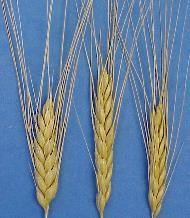 Emmer wheat Emmer wheat |
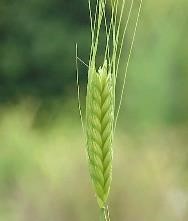 Einkorn wheat Einkorn wheat |
Ewa Czap
In Poland I am a Trainer of Ecological and Global Education in the Center of Ecological Activities "Zrodla" and a student of the Ecological Folk University in Grzybow (EUL Grzybow) where I learn organic farming, and therefore I practice at farm Mr. Slinsky in Slovakia, where I will also write thesis. Visiting the listed farms would be very inspiring for me.
Currently I have ground where I grow soil, deal with vegetable processing and build houses from strawbales and clay. In Slovakia I cooperates with the Bielokarpatsky Ovocny Poklad.
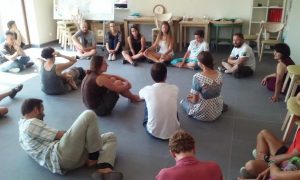 New Ecology High Schools in XXI century
New Ecology High Schools in XXI century
Folk high schools are institutions for adult education that generally do not grant academic degrees, though certain courses might exist leading to that goal. The concept originally came from the Danish writer, poet, philosopher, and pastor N. F. S. Grundtvig (1783–1872). Grundtvig was inspired by the Marquis de Condorcet's Report on the General Organization of Public Instruction which was written in 1792 during the French Revolution.
The character of folk high schools differ from country to country, but usually institutions have the following common features:
- Large variety of subject
- No final exams
- A focus on self-development
- Pedagogical freedom
- Courses last between a few months and one year, with per-course fees
- No entrance exams
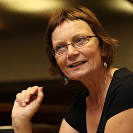 Eva Hauserová
Eva Hauserová
Czech editor, writer, translator, permaculture organizer, teacher and gardener
Czech farming project and KomPot
KomPot is a NGO for the Prague residents who are interested in growing healthy vegetables for themselves and also of community and sharing. It’s a unique combination of a community garden and community-supported agriculture (CSA). Specialization: vegetable production, beekeeping, a new form of CSA and community gardening fusion

Permaculture farms Veselá biofarma and Pozemská zahrada
Veselá biofarma (Cheerful biofarm) is an agricultural project of a group of friends who have been working for organic farming in the Czech Republic for over twenty years. The goal is to show that "BIO" is no luxury and that it is reasonable and normal to manage the environment and that we can enjoy it too.
We are doing well in cooperation with VH Agroton, which has managed as a "bio" since 2008, 380 hectares in the village of Velké Hostěrádky. This village is unique because there are three other organic businesses in the immediate vicinity with a total area of 160 hectares. Such a concentration of ecologically managed arable land in the South Moravian region is indeed unique.
Traditional and less traditional crops, medicinal plants, orchards and vineyards, varietal crop rotation, anti-erosion measures and, last but not least, the welfare of animals and humans - all according to the principles of organic farming, are the central ideas that we turn into here.

Pozemská zahrada is a family farm (1,6 ha) with an old traditional farmhouse, forest garden, vegetable plot, herb garden and animal pastures (horses, sheep, cows). Alena Gajdušková focuses on finding out and reviving the old methods and techniques of farming and housekeeping, like traditional domestic healing, production of natural cosmetics, cooking of traditional Czech meals for tourists - on-line advertisement of a “domestic restaurant”, processing of food (milk, cheese, meat etc.), her husband teaches using horses in draught, excavating the ponds etc. Specialization: old traditional varieties of fruits, vegetable production, herb production, work with horses, sheep and cow products, education, designing of natural and permaculture gardens (main source of self-support).

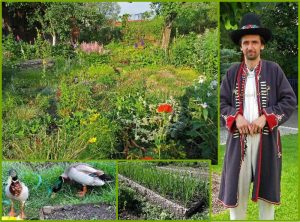 Garden of the Future – project of Petr Haba
Garden of the Future – project of Petr Haba
An example of a very diversified project of a permaculturist who supports himself by many ways: by growing medicinal herbs (8 acres) including very exotic species, by producing his own food (self-sufficiency) both in forest garden (0,5 ha) and in an intensive plot (0,5 ha of annuals), by educating (teaching courses) and other.
Subsistence farming and agroecological research go hand-in-hand in this project Farming practices are principally "biointensive," which fosters healthy soils, conserves space, and requires very low input, while maximizing yields and increasing sustainability and overall health of this small-scale food production system.
Permaculture farm of Ivana Květoňová
We live in the village Sedlo from 1989. We operate in an organic way on 38 ha of land on Tepelska plateau in the altitude of 650 m above sea level. Most of our land consists of permanent grasslands - meadows and pastures, we have ha of arable land - the cereals, fodder plants and 2 ha of mixed growth, an orchard and ponds.
Mr Kveton cares of the agriculture land and cattle. He is keeping the Japanese meat breed wagyu both full-blooded and crossed with the aberdeen angus.
Ms Kvetonova is an agriculturist and nature protectionist. She is keeping horses - crossbreeded with Wales full-bloods - using methods of natural communication - horsemanship. She takes care of the landscape and of the conditions of all the live beings.
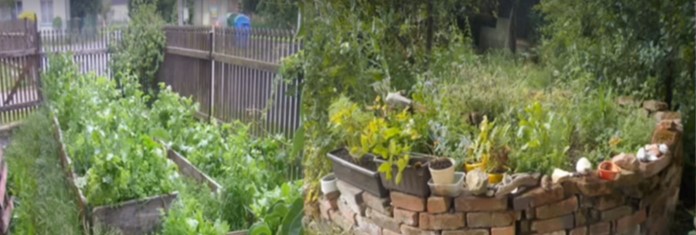
Central European network of permaculture demonstration sites
Presentation of the Czech network of demonstration PC sites as the inspiration for creating a multi-national network, discussion
 Feоdor Ryabinin
Feоdor Ryabinin
Feodor is an expert in organic (natural) gardening. He has a solid experience in designing and creating ornamental and fruit gardens. He is skilled in training, pruning and grafting the fruit trees and ornamental plants. Feodor is specialized in creating hedges and topiary (clipping shrubs or trees into ornamental shapes). In 2011 in Donetsk (Ukraine) he created Biological Complex "Joyful Garden" where he collects an unique animate and inanimate objects. He conducts practical and theoretical workshops for amateurs and professionals throughout Ukraine. The topics of his seminars include: garden design, training, pruning and grafting. He is the author of the basic course "Joyful Gardener" for amateurs and professionals. Feodor conducts field research in his garden where he applies different techniques of natural agriculture. He is constantly testing all new gardening tools that appear on Ukrainian market and writes the analytical reviews. He is fond of sharpening different implements, including garden tools, so he constructs special equipment for sharpening.
Rejuvenation technology of fruit trees with cultivar change
The most troublesome trees I have encountered since the start of my career as a gardener were the cultivars grafted to natural seedlings. They start to fruit later compared to normally grafted trees, but due to the vigorous growth they required significant annual pruning. The real problem starts if pruning does not perform for 3 or more years. Fruiting zone begins to move upwards quickly, while conveniently accessed part of a tree becomes a dieback zone.
After 8 years of my experiments I have found a solution that allows simultaneously:
- To reduce the height of the overgrown trees from 2 to 3 times (up to 2 - 3 m);
- Partly change the variety to more productive and modern;
- Significantly rejuvenate the tree.
I would like to share this technology for permaculture farmers and designers as it allows to sustain yield for decades without grubbing the orchard and planting the new trees. I consider it perspective when creating a forest garden on the plots with many voluntary seedlings of the fruit trees.
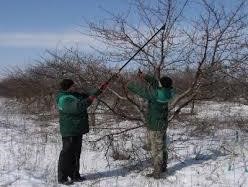 |
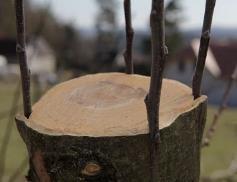 |
 Ján Šlinský
Ján Šlinský
Founder of a Community supported biofarm growing organic vegetables on a very inventive and original principle of “circles”. See presentation Agrocircles - Implementation of sustainable Strategy of growing and sales of vegetables.
Growing vegetables between idealism and technocracy
The Project basically begun in 90´s when I resigned at the state agro coop as the head vegetable farmer, facing the dilemma of how to continue my dream of becoming a vegetable farmer which I had since the 6th grade. That time begun the debate about ecological production, considering that mainly vegetables, which were my professional speciality, are most sensitive to the use of agro-chemicals. Firstly, I realised that farming without herbicides demands so much manual labour that one person can´t handle. Secondly, I knew from experience, that farming vegetables with employees is very hard. And to do it ecologically is basically impossible, because sometimes even I am not strong enough to put the theory into reality.
And so gradually, those differences of professional and ethical character, considering my aviation model hobby, where I used my technological and innovative abilities, gradually combining it together: a professional vegetable producer, ethically refusing to use agro-chemicals, and a model airplane constructor who could build his own gadgets that could replace the hoe, designed a system that should be able to stop soil degradation immediately, and liberate the peasant from hard manual labour which in ecological agriculture is guaranteed automatically, and can very intensively destroy the initial enthusiasm and idealism.
Jennifer and Partick Lauruol
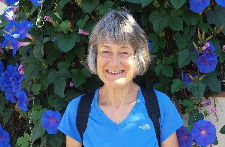 Jennifer Lauruol is a permaculture garden and landscape designer and teacher. She has over 40 years’ experience as a horticulturalist, and has been providing training to adults and children since 1993. She has run her permaculture design business (www.carpediemgardens.co.uk ) since 2000.
Jennifer Lauruol is a permaculture garden and landscape designer and teacher. She has over 40 years’ experience as a horticulturalist, and has been providing training to adults and children since 1993. She has run her permaculture design business (www.carpediemgardens.co.uk ) since 2000.
 Patrick Lauruol | Business Coach
Patrick Lauruol | Business Coach
Patrick is an experienced business coach supporting small businesses to develop and grow.
He has a passion for helping businesses develop from the ground up, using pattern thinking and Permaculture design principles to inform his work as a business advisor.
Patrick has developed a framework to make starting and developing new businesses easier for people new to business.
www.patricklauruol.com
Jennifer and Patrick use permaculture design principles in their work, and are committed to the three ethics of caring for the earth, caring for people, and social justice through sharing abundance. In business, this is “the triple bottom line”.
The session would be led by Jennifer and Patrick according to their particular expertise. The second part of the workshop would include an active question and answer session.
How you can earn a livelihood through multiple income streams as a Permaculture farmer or gardener
Introduction to some influential business ideas that may helpful in creating and running a business
-
- “Rich Dad Poor Dad” cash-flow quadrants
- Assets (cash-flow generators) vs liabilities and consumer goods
- Understanding the differences between self-employed vs business owner
- Triple bottom line and social enterprise (business doesn't have to mean corporate globalisation and rampant capitalism)
Vision vs market led entrepreneurship / what is marketing? / supply and demand
- Is there a market for your service? (Learning market research techniques)
- The “Mom Test” / Customer Development interview techniques
- Risk analysis sessions
- LoNGPESTLE
- Startup risks
- Value proposition design / business model design
- Exploring existing assets and skills which could be used to create a livelihood
- Elaborating your value proposition leading to the creating of products and services / (value proposition design)
- Holmgren's permaculture flower petals as a framework for finding a value proposition
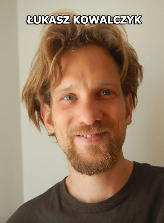 Łukasz Kowalczyk
Łukasz Kowalczyk
31 years of age, educated in Ireland's renown UCD with Joint Major BA 1st 2nd Honours in Spanish Language and Economics, now practicing as freelancer translator in real time and interpreter in Polish, English, and Spanish languages. At present practicing the economy of happiness and experimenting in permaculture forest farming. On a daily basis traveller across the world of eco-villages and indigenous traditions, freelancer: in his travels he often partaking in festivals by introducing and supporting green standards, building natural homes with the participation of a community using: wood, clay, straw, wood and stone.
Since 2010 in love and constantly learning of the techniques of permanent agriculture. Starting from 2014 in close relationship with willow and weaving handcraft. Over the past few years he started more and more to value the personal contact with people during workshops: under a roof and especially outdoors. Since September 2016 - father of little Malwa.
Gaia theory and it’s practice in a local community - work in progress - pioneer stage ( Dancing Garden Workshops)
As a person who took travelling as his teacher and his university I visited, did voluntary work and learned in many projects in Europe. Once I found my own place I put my hands to work in order to become a host that can teach you and show you good examples of self-sustainable lifestyle and my path towards living once again in harmony with nature and human society.
In my presentation I focus on the pioneer part of building a permaculture forest farm looking especially at the community building process aspect of creating a permaculture lifestyle.
I point towards the role of intention and integration of previous experiences in the essential unlearning and putting a solid foundation under a garden. Forest garden nas very specific and demanding characteristics - it requires a great deal of quality approach to live by it.
Crucial to my experience in building a permaculture garden is the forest garden’s role as a master teacher and consequently I decided to explore the buffer wild nature zone and edible plants produce as a main focus. At the moment we are working on and learning of making our lifestyle financially sustainable. Our experience shows that community process and group learning is the key to all level abundance including the financial. What is your experience?
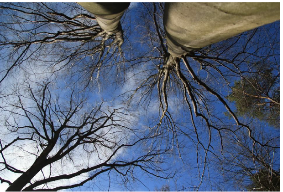 |
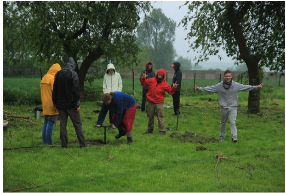 |
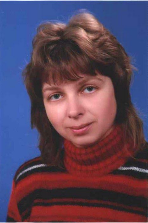 Lyubov Margitay
Lyubov Margitay
Was born in 1970 in the picturesque Transcarpathian village. PhD, Doc. in Uzhgorod National University (Ukraine), Department of Fruit and Vegetable growing and Viticulture, agricultural expert and advisor. Lyubov teaches soil science, land reclamation, and agrochemistry. She has more than 80 academic and methodical publications, around 15 presentations on local and national TV, as well as a number of presentations at the international research conferences. Lyubov practices permaculture design, organic technologies for fertility enhancement, organic methods for cultivation of fruits, vegetables, berries, grapes, medicinal, spice and aromatic plants, ornamental crops, as well as ecotourism.
Organic cultivation of vegetables, fruits, berries, grapes, medicinal and ornamental plants in the system of permaculture design
I will represent the specific of plant cultivation using organic technologies, as well as the main technologies for increasing the soil fertility and creating a stable agrobiocenosis. I will summarize my experience of setting up a permaculture farm on 0.48 hectares plot on a sod-podzolic gleysol formed on alluvial deposits in the former floodplain of Latorytsia river on the territory of the Latoritsky drainage system in Transcarpathia, where a food forest was created with fruits, berries, vegetables, medicinal, spice-aromatic plants and with grapes.
 Maria Paholok
Maria Paholok
Maria is a certified teacher of the Basic of Health Improvement. She has completed the course "Reinhold Voll Method of Electroacupuncture Diagnostics". She is a valeologist and Vice President of the International Federation of Combat Hopak (traditional Ukrainian cossack's dance), where she is studying the impact of this practice on pupil’s health. Maria is also a co-founder of Galician Lyceum of Sacred Arts and Crafts in Opillya, Poltava region, Ukraine.
Maria participated in organizing a number of festivals and conferences in Western Ukraine, for example, Creation of Carpathian Brand for Local and Traditional Products and Services (2011), eco-festival Lolyn (2015), eco platform Porto Franko Gogol Fest (2016), etc.
Wild plants for health and business
Wild plants help us to expand our diet and cook new delicious, healthy and cheap dishes that can compensate our nutrition for a common lack of vitamins and minerals.
Cultivation of the medicinal plants is always more profitable than grain production: twice for chamomile and valerian and 500% or more for some herbs. Processing of herbs will significantly increase the profit. According to WHO, during the next decade, the market share for herbal medicines will reach 60% of the pharmaceuticals market.
Cultivation of medicinal plants in the Carpathians is a forgotten business that could improve both environmental, economic and even social situation. Many of Carpathian plants have almost extinct due to overexploitation, exactly this species of medicinal herbs Maria has been cultivating on her plot for the last 30 years, and she will share her experience.
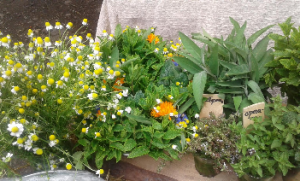 |
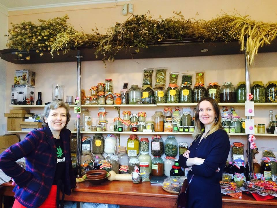 |
 Pavlo Ardanov
Pavlo Ardanov
Pavlo Ardanov completed his PDC in 2011 and Permaculture Teachers Training with George Sobol in 2013. In 2012 he obtained PhD degree in plant physiology at the University of Oulu specializing on Plant-Microbe interactions. Pavlo is co-founder and the Head of NGO Permaculture in Ukraine, permaculture teacher, designer and translator. Since 2012 Pavlo is one of the delegates from Europe in the International Permaculture Conference and Convergence Council.
Permaculture for Farms: planning future collaboration
Visegrad Permaculture Partnership was created in September 2016 to share the best experience of permaculture farming and support development of the permaculture education and demonstration networks in our countries. The founding organizations are Permakultura (CS), the Czech Republic, Ecological Institute for Sustainable Development, Hungary, Deep Democracy Foundation, Poland, Permaculture SK, Slovakia, and NGO “Permaculture in Ukraine”, Ukraine.
What kind of support do the permaculture farmers need in Central Europe? Specialized courses and workshops? Internship opportunities in the region? Sharing best practices at the international meetings ? Consolidation our national networks of permaculture demonstration sites? Organizing international farm tours? Community seed banks?
Your opinion is valuable for us - please, come and share! We are open for new partners within and outside of our region!
 Petr Marada
Petr Marada
Professor of the Mendel Universtity in Brno, Counsellor of the Ministry of Agriculture. Uses official grant system of Ministry of Agriculture and Ministry of Environment for systematic improving the health of the landscape, water and soil management, counteracting the water and wind erosion by planting so-called “scattered vegetation” - windbreaks, small groves, bio corridors etc. See presentation “How to use creativity in daily management of an ecofarm”.
Implementation of the Programme of development of the countryside by means of eco-agro enterprising focused on ecosystem services in the Czech Republic
Petr Marada is operating in South Moravian village Šardice, where he owns land. The practice of current conventional intensive farming has disastrous effects on the soil, causing its degradation and erosion, and also to the water cycles in the landscape. The solutions used by Petr Marada are increasing the biological diversity, preserving and developing the agricultural and forest ecosystems of high natural value, consolidating the soil and retention of water in the landscape. Several examples of newly created wetlands, extensive orchards, biocorridors, groves and other landscape elements will be demonstrated.
These plots are also producing organic fruit, biomass, they support the pollinators and the other wildlife, and are source of education and inspiration for the others. They support the overall development of the countryside, reviving of its traditions and its local communities.
 Robert Palusinski
Robert Palusinski
I work with groups as a trainer since 1998 and as coach, therapists, teacher and facilitator since 2002 in Poland and also abroad using Process Oriented Psychology (Processwork) as my main approach.
I teach Process Work and Deep Democracy in Poland, Estonia, Germany, Slovakia and Italy (I had privilege to introduce Deep Democracy to this country in several places and now it is blossoming!).
From many experiences I know that every organisation and group - from the smallest unit to the global company is human-like, living organism and each has it's own way and unique wisdom and the role of the facilitator is to help to have access to it.
I live in Krakow, Poland and work as psychotherapist, counsellor, coach and facilitator in Poland and around the Europe. I'm ex-president and co-founder of the Deep Democracy Foundation where I teach how to work with conflicts and promote organisational awareness with groups from all walks of life using Worldwork and Deep Democracy methodology and Dragon Dreaming Process Design. In my work I integrate Process Oriented Psychology with Carl Gustaw Jung work with Buddhism and Zen practice and shamanism.
Deep Democracy meets Permaculture: the cutting edge of diversity!
Diversity in the ecosystem is significant to human existence for a variety of reasons. Ecosystem diversity boosts the availability of oxygen via the process of photosynthesis amongst plant organisms domiciled in the habitat. Diversity In an aquatic environment helps in the purification of water by plant varieties for use by humans. Diversity increases plant varieties which serves as a good source for medicines and herbs for human use. A lack of diversity in the ecosystem produces an opposite result.
But how about people's diversity - both: their inner and outer life?
Can we look at any given person and/or the group as the ecosystem?
Deep Democracy unique approach emphases that diversity is a condition of sine qua non of any sustainable human system. Unfortunately our xenophobic parts are often against the "unknown" or "foreign" parts treating the other as potential enemy or "weeds".
Process Work and Deep Democracy bring together the outerwork of social activism with the innerwork of psychology and meditation, grounding it in our connection with the sentient earth.
One of the most important goals of Deep Democracy is nurturing diversity awareness and also our natural tendency to discriminate and marginalise unwelcome parts. When some tension or social complexity arise there is often a tendency to marginalise our inner diversity and (in the same pattern) the outer diversity of the situation. In essence Deep Democracy is about fostering awareness within and of oneself and in groups.
From Deep Democracy point of view any so called “unwelcome” behaviours or figures are important and necessary for the diversity of the system to thrive !
It is the same when we look at weed or parasites through the permaculture's lenses.
Is it possible that Deep Democracy might be in fact the permaculture for the human systems ?
Let's look at the astonishing similarities and diversities 🙂
 Simona Albrechtová
Simona Albrechtová
I am interested in permaculture, I am generally interested in plants and horticulture, which I graduated.
Botanical pesticides and biomanagement of pests
When we are growing plants, we can encounter a variety of pests and diseases that devalue our crops. Effective solutions offer the production of decoctions, extracts, infusions and extracts from herbs, which will help the cultivated plants not to be attacked.
In addition to these proven methods that belonged to the traditions of our ancestors, we should not forget the natural enemies of the pests.
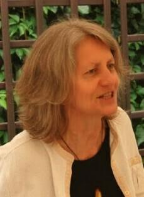 Dr. Sławomira Walczewska
Dr. Sławomira Walczewska
Philosopher, feminist author and activist, co-founder and co-director of the Women's Foundation eFKa, member of council at, a.o: Center of Women's Rights, Workshop for All Beings, LGBT-Foundation, Deep Democracy Fundation. Co-editor of the feminist magazine "Zadra". Publications a.o.: "Ladies, Nights and Feminists. Feminist Discourse in Poland", 1999 (in Ukrainian in "Ji", in Slovak in "Aspekt", in Italian in "it.pl", German version published in 2015), "Feminists. In their Own Voice", articles.
Current affiliation: Feminist Institute for Research and Education at eFKa, tel. +48 - 602 120 142, Cracow, Poland
Permaculture in the Gendered World
Who feeds and gives a birth? Women and nature. Who is expected to give food and to give birth? Tired, exploited nature and frustrated, over-worked women. How is the feminist intervention in such situation? First of all, there is no one proper feminism, but many feminisms. However, most of feminisms is an attempt, to make a voice of the frustrated, over-worked women heard. The trials, to stop that attempt by blaming feminists as “murders of the unborn children”, do not work anymore. Murdering, war, unhealthy food and global pollution are coming from somewhere else, but not just from feminists.
We are trained to perceive all our social relations through the gender glasses and to see in each person either a man, or a woman. Permaculture offers something else: it is a way to learn diversity and to respect it both in the nature and in the social world.
 Tamas Varga
Tamas Varga
Tamas graduated as a teacher and working as an IT professional for more than 16 years. Back in 2003 WWOOFing 2 months in New Zealand was a life changing experience for him. In 2009, he established WWOOF Hungary and started to work with hosts and volunteers locally. In 2012 was elected as a director of Federation of WWOOF Organizations and since 2015 serving as a vice Chair of the Federation. Participate multiple projects with the neighboring countries and also was part of the "Living and Learning on Organic Farms" project together with 10 European countries.
Introduction of WWOOF and the possibilities of an organic network
World Wide Opportunities on Organic Farms (WWOOF) is a wonderful way to experience rural life, see beautiful places, get physical exercise, and learn how to produce healthy food sustainably. WWOOF was born in the autumn of 1971 and soon spread abroad and today, some 45 years later, we have gone global. There are currently around 60 WWOOF organisations and you can WWOOF in over 130 countries. National WWOOF groups are all self-governing but co-ordinate regularly to keep the movement in good working order and introduce improvements. The Federation of WWOOF Organisations (FoWO) is a non-profit company that acts as the umbrella body for WWOOF national groups around the world to come together and co-operate.
I would like to introduce the WWOOF movement and the Federation, how we can help local farmers and communities, how this educational network helps anyone to learn more about the organic agriculture and sustainable life, also how farmers can share their knowledge and expertise for a healthier life and more sustainable future.
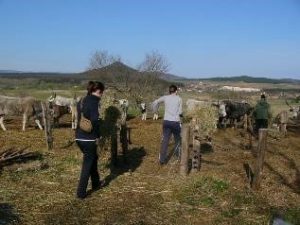 |
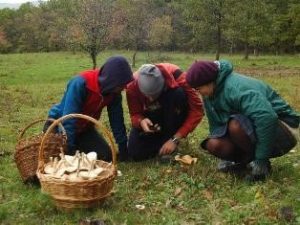 |
 Тetiаna Chuchko
Тetiаna Chuchko
Tetyana Chuchko has a background in phytodesign. Since 2006 she is the Head of Lviv branch of NGO Organic Farming Club. Tetiana completed PDC in 2011 and Permaculture Teachers Training Course (teacher - George Sobol) in 2013. Co-founder and the Leader of Education Group in the NGO Permaculture in Ukraine. Permaculture teacher, designer and facilitator. Tetyana is creating the cooperative of Ecological Producers in Lviv Region.
Worm farming: from the single box to the whole farm
Worm farming is a good example of how to transform agricultural, food industry and household waste into profit or valuable resource for your farm. It can create multiple incomes: biohumus, worm tea, worm biomass, and earn from waste disposal. 1 tonne of the raw material transforms to approximately 600 kg of biohumus and 300 kg of warm biomass.
Single household produces on average 300-600 kg of the kitchen waste annually that composes 50-80% of the waste-bin being the most problematic refuse on the damp sites.
Worm farm can start from the single box with very little cost or occupy hectares of land with an investment of tens of thousands of euros
We will consider various options, their main differences, pros and cons.
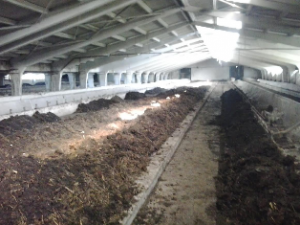 |
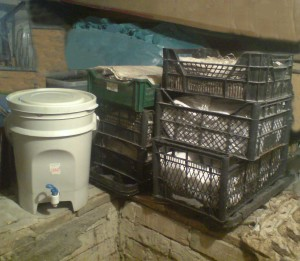 |
Rozum beds: increasing soil fertility in a short time
Some lands may be challenging for crop cultivation because of low soil fertility, poor water holding capacity, in acase of clearing the plot or cultivating the land which is overgrown with weeds. Warm bed developed by Ukrainian school teacher Volodymyr Rozum represents an interesting and suitable solution to these problems.
The main feature of these beds is that we feed the soil biota, not the plants directly. Also these beds always retain fertility, moisture, heat and air needed for plants growth. Once formed there is no need to dig or plough such bed anymore.
The bed helps to increase soil fertility, reduce plant morbidity, and could be formed with machinery. Altogether these make them a good choice for commercial horticulture, gardens, and greenhouses.
During the conference, you will get a detailed instruction on how to create such bed and you will see some working examples.
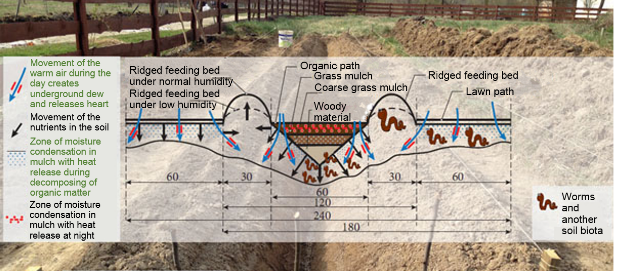
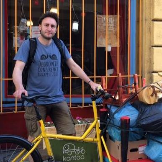 Vincent Liegey
Vincent Liegey
Сo-author of A Degrowth Project, Éditions Utopia, 2013 (Eszmelet, 2014), spokesperson of the French Degrowth movement, engineer and interdisciplinary researcher and coordinator of the Degrowth inspired Cargonomia social cooperative, center for sustainable logistical solutions and local food distribution by cargobikes in Budapest. He was also one of the coordinators of the 6th international Degrowth conference which took place in Budapest in September 2016.
Cargonomia, sustainable transportation, healthy and local food and convivial space in Budapest
Cargonomia (see also Facebook page and videos Cargonomia - Cargobike & local food distribution hub - Budapest, and Vincent LIEGEY on Degrowth and Cargonomia) is a partnership between social cooperatives and a social enterprise. Being a cooperation between a cargobike messenger company, a biodynamic farm and low-tech design and fabrication cargobike workshop, Cargonomia operates as a food distribution and cargobike sharing point. Moreover, Cargonomia offers an open convivial space for community and educational activities related to degrowth, well-being, ecology and sustainable transition or agriculture. Cargonomia is coordinated by five committed members and, also cooperates with several other local partners. Today, Cargonomia with its diverse activities aims to present an alternative way of organizing not only economic activities but to question the meaning of work, re-appropriate technology and food production and to construct urban sustainability with also better cooperation and dialogue with rural areas.
Cargonomia is now about to launch its last project about urban agroforestery and is enthusiastic to share with you its experience in an open participatory discussion workshop.
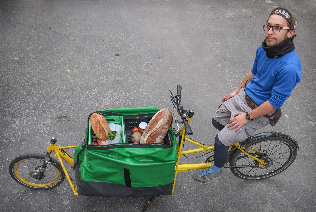 |
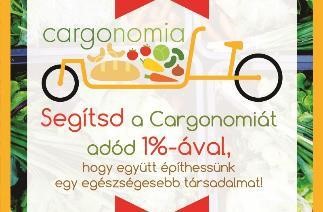 |
Degrowth and permaculture
"Degrowth" (see also Facebook page and An Interview with Vincent Liegey on Degrowth) has emerged over the last 10 years. This "bomb word" has been used to open in-depth debates on whether infinite growth in a finite world is desirable or even possible. Degrowth warns about a potential crisis of civilization and answers this by exploring alternative and coherent solutions on different levels. With a multidimensional understanding of the interconnected challenges we face, degrowth questions how could we implement democratic and serene transitions toward new relocalized but connected models of society based on social and environmental justice.
Since its beginning, Degrowth also often connected with other movements like the transition network or local initiatives like community supported agriculture. In this discussion, links, complementarities and convergence between Degrowth and permaculture will be discussed in particular from a philosophical point of view.
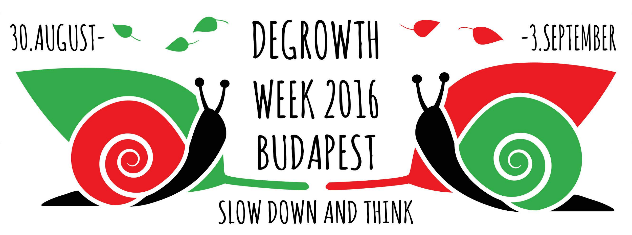
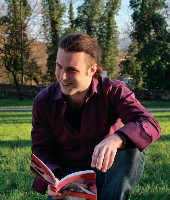 Zbigniew Janczukowicz
Zbigniew Janczukowicz
Master of Philosophy of the Jagiellonian University. Traveler, writer, story-teller, who have spent several years in many permaculture farms, for in 2015-16 running an informal, open education center in Średniówka, eastern Poland.
A certified teacher of philosophy and ethics, who prefers working for Waldorf institutions and forest nursery schools.
In the years 2014-2015 lived in Indonesia; intends to return to Borneo for PhD research, which is about interpreting the self-sufficiency of local farms on this island as a tool of resistance to the process of javanisation.
One year on permaculture farm – Integrating with local community
I will present an expanded photo and video material from permaculture farm in Średniówka, from years 2015-16, when I was living there permanently and organizing a lot of activities, which are:
Regular meetings with local children – teaching English, trips to the forest: recognizing trees and edible plans, workshops with clay and wood.
Winter-holiday theatre workshops for local children – preparing a play concerning local agricultural legends, animating parents to renovate for this purpose the old school-building which was unused for 20 years.
Educational Festival „15-Minutnik” (26-29 May 2016) - inviting school teachers from neighborhood to our stage, integrating local community to have fun without alcohol.
Collecting stories and songs from older people and traditional musicians living in the neighborhood.
Ecological cooperation with local countryside:
- exchanging vehicles and materials (receiving hay for cleaning the barn, getting cars repaired for lessons for children etc.);
- exchanging food (receiving milk and cheese for letting cows to our field;
- collecting fruits from unused orchards etc.);
- exchanging knowledge about herbs and traditional medicine;
- collecting legally out-of-date food and cartoons for mulching from local shops.
I will summarize the gained experience, what we have achieved and what can be improved. I want to share some ideas and strategies about what should we sacrifice in order to create mutually beneficial relationship with local community, and finish with the accent that it is not easy, but surely worth the effort.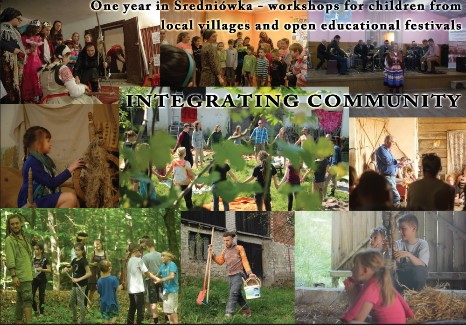
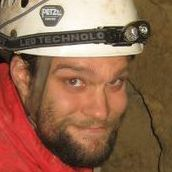 Zoltán Lengyel
Zoltán Lengyel
Zoltan took over the family farm - after spending 15 years as a programmer living in Budapest - in one of the driest places in Hungary, at the edge of Hortobágy. This farm became Táncoskert, the first hungarian meat/egg CSA. Now he runs it as a profitable, holistically managed eco/permaculture farm.
Táncoskert - profitable permaculture through CSA
- Parents are/were arable farmers, but it makes no sense to me
- Spraying poison to our food
- Growing crops on marginal land
- For marginal (if any) profits
- 30 ha
- cattle, sheep, pigs, turkeys, laying hens, chickens, pheasants, partridges, guinea fowls, geese, ducks, rabbits
- 5th year, 4th CSA season
- birds/eggs bi-weekly
- pork monthly
- 100 families at 4 meeting places
- Profitable since the 2nd year
For more information visit farm web-site and facebook page.

Visegrad partnership “Permaculture for Farmers”
|
Permakultura (CS), Czech Republic |
|
Deep Democracy Foundation, Poland |
Permaculture SK, Slovakia |
NGO “Permaculture in Ukraine”, Ukraine |
Our partnership was created in September 2016 to share the best experience of permaculture farming and support development of the permaculture education and demonstration networks in our countries. In March 2017 we received the grant from the International Visegrad Fund which allowed us to implement the project.
All countries in our region have economy with developed agriculture sector, traditionally big ratio of rural population managing small and medium sized farms. Industrial agriculture that rely on cultivation of monocrops over big land areas destroys traditional lifestyle in the Central and Eastern Europe that was based on cooperation of small producers, local food growing and marketing, and straightforward relationship between towns and surrounding countryside based on the trust, mutual support and interdependence. Contemporary farming which requires high initial investment in machinery and agrochemicals and needs less labor force leads to abandonment of traditionally rural regions, work emigration, aging, health and social problems. Contemporary agriculture depends on intensive management, relentless availability of scarce and nonrenewable resources, and generates massive, destructive ecosystem effects.
The mission of our organizations is support and promotion of environmentally friendly agriculture, green energy and energy efficient technologies, healthy lifestyle, protection of natural and cultural heritage and development of self-sufficient communities using the instruments of permaculture (the culture, based on the principles of sustainable development) to solve actual environmental, economic and social problems. In particular, it is establishment and support of the small farms, stimulating the activity of the local communities, regional development through strengthening connection within the bioregions and creating production and economical cycles within the regions. Present project help us co create strong regional network of the permaculture demonstration farms. Initiated collaboration between the small-scale sustainable farmers and permaculture educator should trigger development of the comprehensive education program in agroecology for both permaculture organizations, vocational and higher institutions in the Visegrad region.
Contacts
- Pavlo Ardanov (pavlo.ardanov
 gmail.com, +380969471612 - program coordinator and coordinator from Ukraine)
gmail.com, +380969471612 - program coordinator and coordinator from Ukraine) - Eva Hauserová (predseda
 permakulturacs.cz, +42 737537393 - coordinator from Czech Republic)
permakulturacs.cz, +42 737537393 - coordinator from Czech Republic) - Jozef Fekiač (kancelaria
 permakultura.sk , +421907837317) - coordinator from Slovakia
permakultura.sk , +421907837317) - coordinator from Slovakia - Iván Gyulai (gyulai
 ecolinst.hu, +3646413390) - conference organizer and coordinator from Hungary
ecolinst.hu, +3646413390) - conference organizer and coordinator from Hungary - Robert Palusinski (r_paluch
 wp.pl, +48505476964) - coordinator from Poland
wp.pl, +48505476964) - coordinator from Poland
What is permaculture
Permaculture is a system of agricultural and social design principles centered on simulating or directly utilizing the patterns and features observed in natural ecosystems. It is possible to create more resilient farms requiring less labour and resource input by establishing functional relationships between the elements. Permaculture farming is a noble occupation changing our land management from destructive to nature restoring, connecting farmers and citizens in the mutually supportive community. Read more about permaculture.

